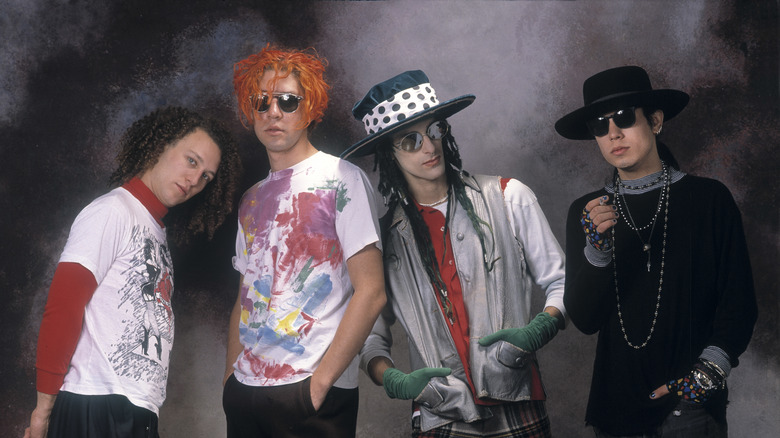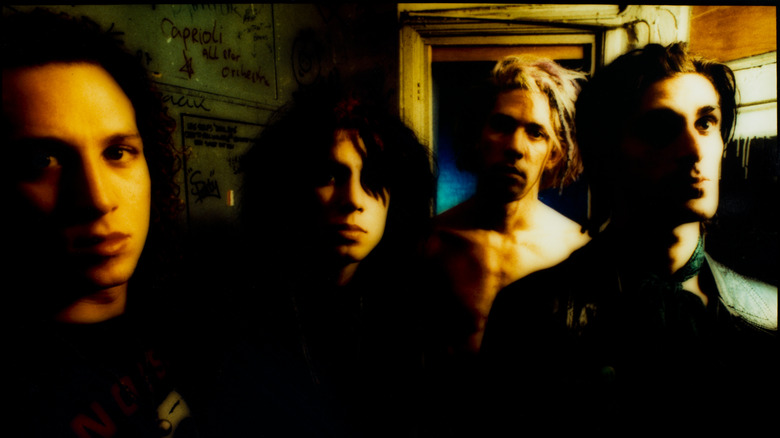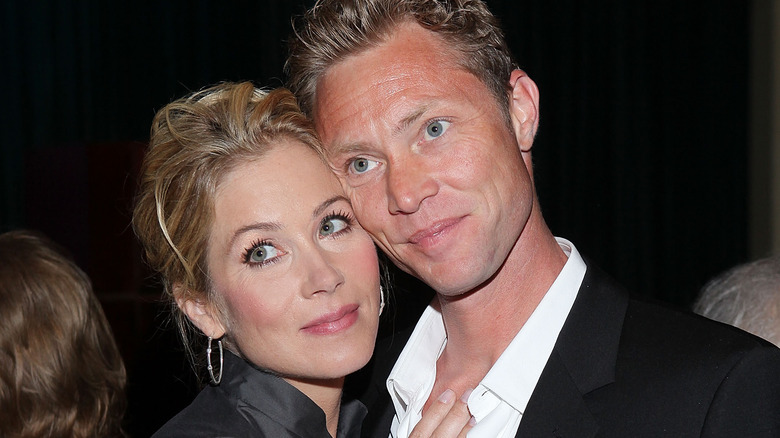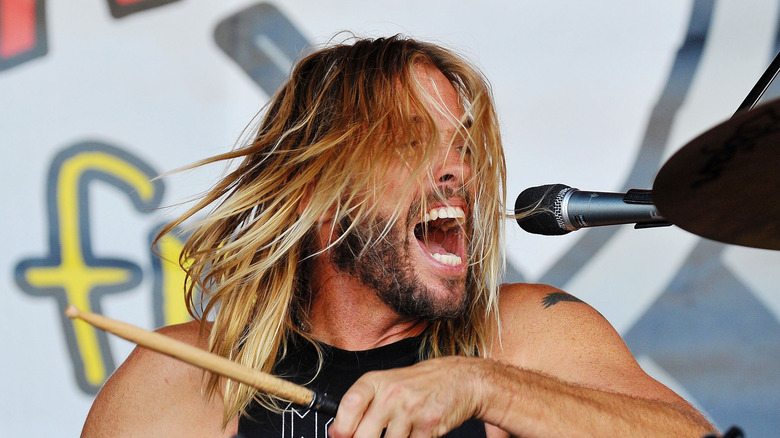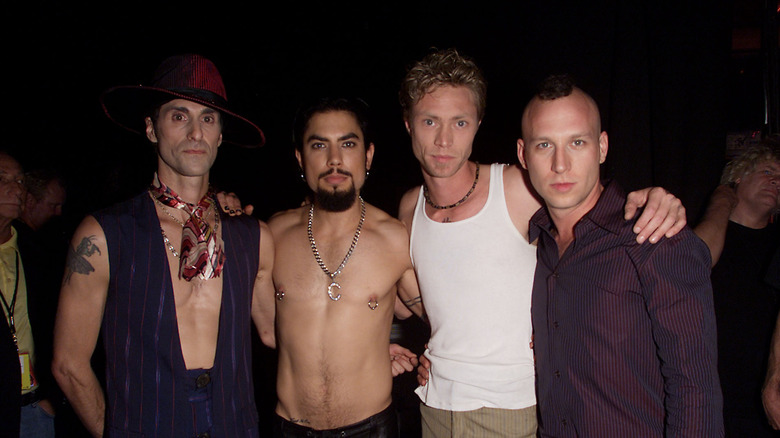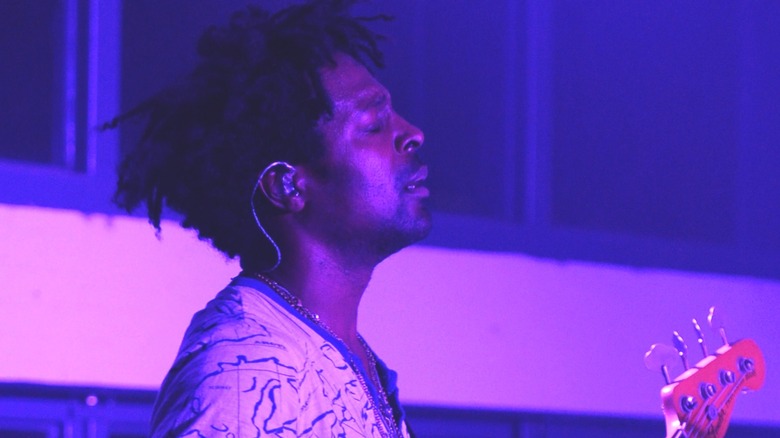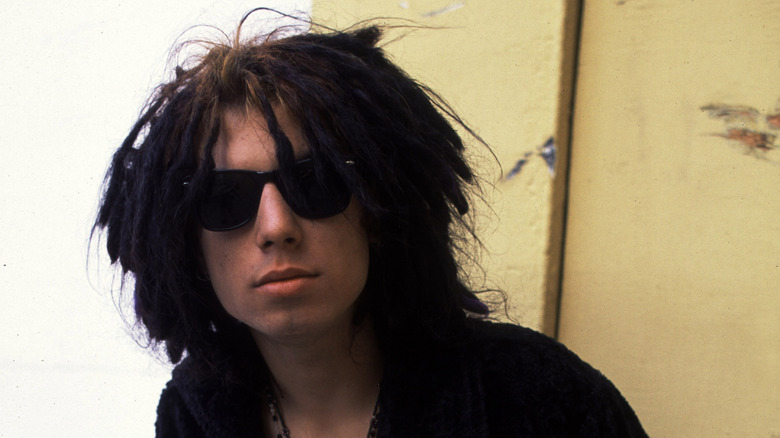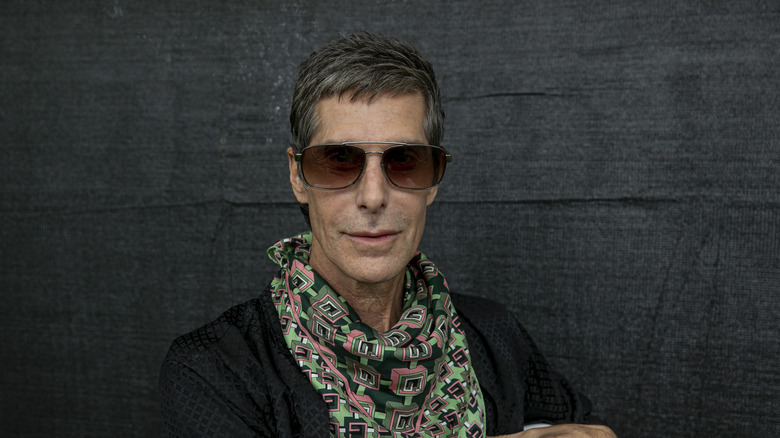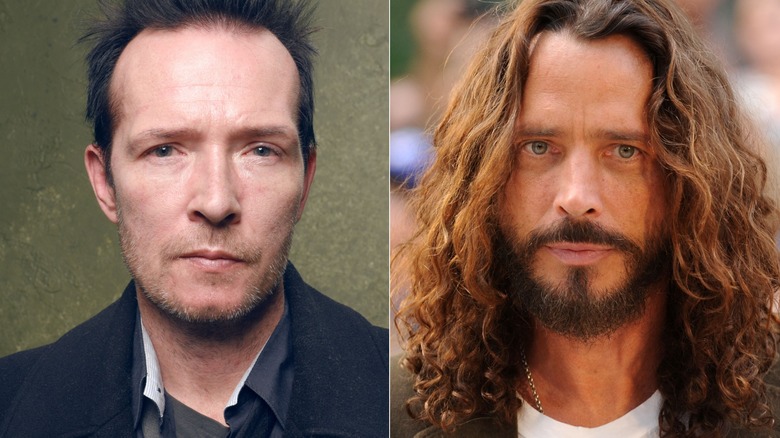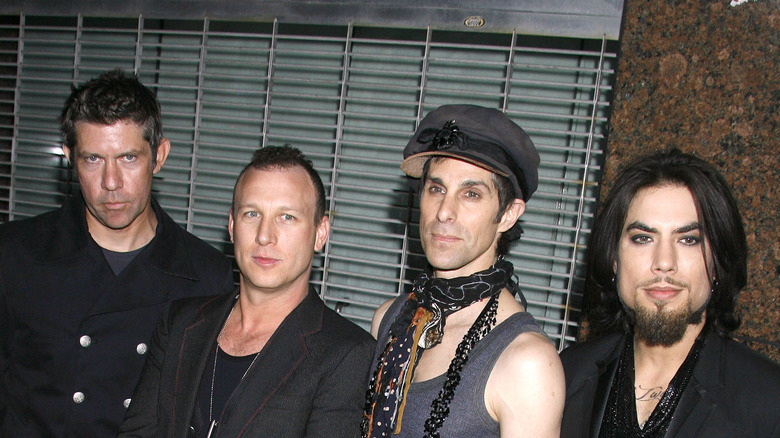The Tragic Real-Life Story Of Jane's Addiction
Jane's Addiction came storming out of the Los Angeles music scene in the late 1980s. Bridging the gap between sleazy, debauched hair metal and the boundary-pushing alternative rock that would define the '90s, Jane's Addiction offered a visceral and enchanting brand of rock music, influenced in equal parts by punk, hard rock, and psychedelia as it wove party-ready tales of lust, drugs, and the dark side of humanity. Led by singer and provocative showman Perry Farrell, supported by the intricate bass work of Eric Avery and the haunting guitar of Dave Navarro, with the powerful yet nuanced backing of drummer Stephen Perkins driving the music, Jane's Addiction took weird rock into the mainstream with the likes of "Jane Says," "Mountain Song," "Been Caught Stealing," and "Stop!"
Through numerous breakups and make-ups, the members of Jane's Addiction have been important figures in pop culture for more than 35 years. And as public figures who have embraced the rock 'n' roll lifestyle to its fullest, they've been beset by more than their fair share of tragic, traumatic, and just plain terrible happenings. Here's a look at the truly awful moments in the lives of the guys forever linked to one another via Jane's Addiction.
Perry Farrell's mother died by suicide
Perry Farrell is a flashy rock star who parlayed his status as the frontman of Jane's Addiction and Los Angeles scenester into side careers as a music festival organizer, concert promoter, and philanthropist. His personality and philosophies take inspiration from both of his parents. "My dad was a real character, a fun guy," Farrell told Spin. "He was a jewelry designer and repairman. I got a lot of creativity from him. My mother was a fine artist. She loved to take throwaway things and make art out of them."
In late 1962, when Farrell was 3 years old, his mother died by suicide. "I remember it, yeah. There are some things that have deep-seated emotions for me, but you can't change it and you move on," he told The Guardian in 2003. According to Jane's Addiction music video director and former Farrell partner Casey Niccoli, the musician pinned his mother's suicide on his father, Al Bernstein. "Perry blamed him for his mother's death. Al was bringing a lot of women into the house and doing drugs and stuff when he was younger," Niccoli told Spin.
Dave Navarro's mother was murdered
Future Jane's Addiction guitarist Dave Navarro was raised by divorced parents, primarily living with his mother, model Connie Navarro. In 1983, the elder Navarro split up with a boyfriend, John Riccardi, and he responded with extreme violence. "There was a point where he had broken into the house and held me up and handcuffed me and basically got pretty violent and then let me go," Dave Navarro told "The Howard Stern Show" in 2001. A week later, Riccardi returned to the Navarro home in West Los Angeles and killed Connie Navarro. "And my aunt who happened to be there," Dave Navarro explained. The musician was 15 years old at the time, and he went to live with his father, who resided nearby.
Riccardi was the main suspect in the murder case, and he avoided capture by police for nearly eight years, finally apprehended in 1991 after his case was featured on "America's Most Wanted." Riccardi was convicted for the double murder and received the death penalty. In 2012, the death sentence was overturned, then converted into life in prison with no possibility of parole — a sentence that was upheld by an appeals court two years later.
Drugs got Chris Brinkman fired from Jane's Addiction, then he died from an overdosed
Following the breakup of his band Psi Com, Perry Farrell formed a new act in 1985, recruiting Eric Avery to play bass guitar. Avery brought in his childhood pal Chris Brinkman to be the lead guitarist in the initial lineup of the group that would eventually be known as Jane's Addiction. The son of a Los Angeles executive and 1950s movie star Jeanne Crain, Brinkman added energy and panache to the proto-Jane's Addiction, notably taking the stage in only his underwear.
Brinkman also had a significant problem with substance abuse, and after around 18 months as the guitarist for early Jane's Addiction, the rest of the band fired him, because his personal issues made him undependable. "He just spun out of control on drugs and eventually OD'd," Jane's Addiction associate and namesake Jane Bainter told Spin. "He was so dysfunctional that he couldn't even show up," Bainter said in "Wh***s: An Oral Biography of Perry Farrell and Jane's Addiction," speculating that Brinkman's fatal overdose was intentional. His unresponsive body was discovered in a motel in Hollywood in 1997; Brinkman was 31 years old.
Martyn LeNoble's wife, Christina Applegate, has faced significant health challenges
After the split of Jane's Addiction, Perry Farrell formed Porno for Pyros, where Martyn LeNoble played bass. When Eric Avery didn't want to reunite Jane's Addiction in the 2000s, LeNoble took his spot in that band. A few years later, LeNoble began dating actor Christina Applegate. They were engaged in 2010 and married in 2013. For most of their relationship, Applegate has coped with medical challenges, and so, by extension, has LeNoble. In 2008, Applegate's doctor diagnosed her with breast cancer, a disease to which she was genetically predisposed. To reduce the chance of the cancer spreading, or developing into ovarian cancer, Applegate elected to undergo a double mastectomy as well as have her ovaries and fallopian tubes removed.
"I'm very grateful to Martyn for coming along at a time that he did because he's been my rock through all of this," Applegate told People in 2009. "He gave me something to really want to live for and something to smile about."
After experiencing tremors and lack of feeling in her appendages and then losing her balance on the set of "Dead to Me," Applegate was diagnosed with multiple sclerosis, a neurological disease that can slowly take away a person's ability to walk, see, and speak. Having already suffered a significantly diminished capacity for movement, balance, and strength, Applegate retired from on-screen acting with the conclusion of "Dead to Me."
Chris Chaney's close friend and bandmate, Tyler Hawkins, suddenly died
Chris Chaney joined Jane's Addiction on bass guitar for a reunion album in 2002, in the place of not-interested original bassist Eric Avery. When the band temporarily dissolved again in 2004, Chaney moved on to several other bands, including Panic Channel (with Jane's Addiction cohorts Dave Navarro and drummer Stephen Perkins) and NHC, with Navarro and Taylor Hawkins, best known as the longtime drummer for Foo Fighters. Chaney and Hawkins became friends when they were in Alanis Morissette's backing band in the 1990s; Hawkins introduced the bassist to the music of Jane's Addiction years before he'd join that group. "I gave him 'Ritual de lo Habitual' on CD and I said, 'Learn this,'" Hawkins told Forbes. Chaney and Hawkins were such compatriots, professionally and personally, that they formed yet another group together, Taylor Hawkins and the Coattail Riders.
"He was very close with Taylor," Jane's Addiction singer Perry Farrell told Rolling Stone of Chaney, noting that his relationship with the bassist suffered after their mutual friend, Hawkins, died. The drummer and Jane's Addiction pal was found dead in his hotel room in Colombia during a Foo Fighters tour in March 2022. While Hawkins had several potentially dangerous intoxicants in his body at the time of his death, his demise was ruled to be caused by an enlarged heart. Hawkins was 50 years old.
Jane and Sergio are real people
The "Jane" name-checked in Jane's Addiction, and the central character of the band's 1988 breakthrough hit "Jane Says," are actually the same Jane, and she's a real person. In 1985, singer Perry Farrell and bassist Eric Avery lived in a home and rehearsal space in Los Angeles with several other people, including a woman named Jane Bainter, with whom Farrell became fast friends. She was heavily dependent on heroin, which inspired Farrell to name his group Jane's Addiction. "I found her to be very strange and special," Farrell told Billboard.
"Jane Says" consists primarily of phrases uttered by a woman addicted to drugs, who doesn't want to be ("I'm gonna kick tomorrow") and who feels trapped in a controlling and abusive relationship with a man ("Jane says 'I'm done with Sergio.'") "Sergio was a drug dealer who lived nearby," Bainter told Spin. "I was strung out, and he was using that to manipulate me." The line about Jane hoping to move to Spain is painfully true, too. "My parents divorced, and my mother and her new husband bought this house in the south of Spain," Bainter said. "I had the opportunity to go over there, but I couldn't because I was strung out."
Dave Sitek's bandmate, Gerard Smith, died
In 2011, Dave Sitek became the latest musician to occupy the role of bass guitar player in Jane's Addiction, heard on the album "The Great Escape Artist." He came to the LA band after co-creating and playing multiple instruments in the Brooklyn-based indie art rock collective TV on the Radio.
TV on the Radio's LPs "Return to Cookie Mountain" and "Dear Science" are among the most critically lauded albums of the 2000s, and they include the bass guitar work of Gerard Smith. Sitek joined Jane's Addiction just a few months before TV on the Radio would be thrown into grief and disarray when Smith died in April 2011, at the age of 36. "We are very sad to announce the death of our beloved friend and bandmate, Gerard Smith, following a courageous fight against lung cancer," the members of TV on the Radio wrote in a website statement (via NPR). "We will miss him terribly."
The death of his friend and musical partner shook Sitek. "We're all flying on a giant rock through space; we can't control anything," he told The Guardian when asked about Smith.
Dave Navarro contemplated suicide
Two well-liked and well-respected celebrities died by suicide in June 2018: designer Kate Spade and food documentarian Anthony Bourdain. The public was largely unaware of the pervasive depression from which both Spade and Bourdain tragically suffered, and with those thoughts in the collective consciousness in the days after those deaths, Jane's Addiction guitarist Dave Navarro shared his personal history with suicidal ideation.
"I can't speak to anyone else's thoughts or actions but I can speak from my own experience. I have been there, written 'the note,' had the plan, the stockpile of meds, how to disperse my property among my family," Navarro wrote in an Instagram post (via Billboard) that he later deleted. "I was ready to go. Luckily, as a last ditched [sic] effort, I reached out. I spoke to my closest friends and loved ones. I sought therapy and at times, psychiatry, alternative medicines, even hospitalization. Whatever it took."
On a 2021 episode of the podcast "Appetite for Distortion," (via YouTube) Navarro discussed his mental health, and how getting a handle on it is an ongoing process. "I've suffered from depression my whole life. I lost my mother to murder at 15, so I have a deeply rooted history of trauma and PTSD," Navarro said. "And I'm here to tell you that there's no external thing that is going to fix the deep-rooted problem of trauma."
Dave Navarro was addicted to heroin
For about three decades, addiction clouded Dave Navarro's life. While he played guitar for Jane's Addiction in the 1980s, he was a heavy user of cocaine and heroin. The latter is a particularly risky substance, and Navarro was aware of — and ambivalent about — the danger. "When I picked up a syringe and shot heroin for my first time, I knew god***n well all the possible consequences attached to that," he told HuffPost Live in 2014. "I had friends who had died, heroes of mine who had died, and I did it anyway."
Jane's Addiction broke up in 1991, for which Navarro takes the blame. "I admit I totally blew it with drugs back in those days. My intake was certainly a factor in the eventual demise of the band the first time around," he told Spin. Navarro so closely associated Jane's Addiction with heroin that when the band reunited in 1997, his sobriety immediately ended. "The second I got into the room for the Jane's Addiction rehearsal, it was like, 'This would be so much better on heroin,'" he recalled on his podcast, "Dark Matter" (via Alternative Nation). Bandmate Perry Farrell helped Navarro acquire heroin, and he suffered a lengthy relapse, using the drug throughout the tour.
Navarro sought out sobriety in the late 1990s, first quitting heroin and cocaine, and then all intravenous drugs. After enduring at least one relapse, which involved opiates, cocaine, and crack, Navarro kicked his addictions in 2016.
Perry Farrell embraced drug use
From before Jane's Addiction found major success to after the group's split and when he fronted Porno for Pyros, Perry Farrell's drug use was such an open secret that in 1993, Rolling Stone's readers named him "Rock Star Most Likely to Die in the Next Year." Heroin and cocaine were the musician's substances of choice, dating back to when Jane's Addiction formed in the mid-1980s. "When Perry and I first started dating, we did heroin together a few times, long before it became a problem," Farrell's partner and band associate Casey Niccoli told Spin. "We thought of it as a way of opening up our creativity."
Every member of Jane's Addiction in its first era found themselves addicted to heroin (all but drummer Stephen Perkins), while Farrell told the music industry trade magazine Hits (via Rolling Stone) at the time that, unlike the other guys in his band, he had no plans to get clean. He proclaimed heroin to be "great," and, when asked to weigh in on its dangers, quipped, "So's driving. You take your chances."
The group's 1990 album "Ritual de lo Habitual" — referring to the ritualistic nature of habits — got its name from Farrell's substance abuse. "In those days, we were hitting speedballs really hard," Farrell told Guitar World. "Our daily life would consist of waking up, going to a spoon, drawing back heroin-cocaine admixtures, slamming them, and getting your day going. So that was our daily ritual."
Farrell never seemed to consider his drug use a real problem but admitted since becoming a father to three sons, he knew he needed to "dial it back." Perry told The Guardian in 2020, "There's a certain time of life to experiment because you have the energy, you've got the mind, but I don't want anyone to get hurt, I don't want anyone to die. I've lost loved ones over it, but I can't lie to you and say I haven't benefited from it either."
The deaths of Scott Weiland and Chris Cornell impacted Perry Farrell
The highest tier of late 80s early 90s alternative rock bands is akin to a brotherhood. The musicians who comprised bands like Jane's Addiction, Stone Temple Pilots, and Soundgarden mingled on the charts, on tour, and backstage at concerts and music industry events. Friendships developed out of common musical interests and aims, and when the people in that small, tight-knit circle die, the intense grief over their loss radiates.
In December 2015, when Stone Temple Pilots frontman Scott Weiland died of a drug overdose at age 48, Jane's Addiction guitarist Dave Navarro broke the news on Twitter (per Billboard). Navarro's bandmate Perry Farrell released a statement of condolence to Billboard. "He had a way of getting into the music, like few people can. He contributed songs we'll never forget to the musical library the whole world sings," he wrote.
In May 2017, 52-year-old Soundgarden singer Chris Cornell died by suicide in his hotel room after a concert in Detroit. Farrell, who met Cornell during the 1992 Lollapalooza festival tour and later befriended him, memorialized the singer for Variety. "Chris was one of the most talented singers of my life," he wrote. "I don't know what did Chris in, but I hope he's in a good place now. He was a super talent and the world should be happy they got to hear him."
Jane's Addiction's 2024 reunion abruptly ended after an onstage altercation
After decades of occasional reunion tours and lineup changes, in May 2024 Jane's Addiction announced it would be embarking on a U.S. tour to span early August and late September and it would include all four original members: Perry Ferrell, Dave Navarro, Stephen Perkins, and Eric Avery. The band even had two new songs they'd created together in 2023 and 2024, which Rolling Stone points out was the first new music from Jane's Addiction in more than 10 years.
The tour seemed to start off without any real hitches, but by the New York shows on September 10th and 11th, one person took to social media to call the show a "trainwreck," elaborating, "Perry was on another planet. Forgetting words, mumbling, singing the chorus during the verse, wandering off stage for long periods. The band sounded tight AF and Dave looked super pissed." Some commenters had similar experiences while others said the shows they saw were great.
Days later, Farrell started a physical altercation with Navarro on stage in the middle of a song while the band was playing in Boston, effectively ending the show and the tour. A public explanation first came from a post on Instagram from Ferrell's wife, then a few days later Perry finally released a public statement to Billboard, saying:
"This weekend has been incredibly difficult and after having the time and space to reflect, it is only right that I apologize to my bandmates, especially Dave Navarro, fans, family, and friends for my actions during Friday's show. Unfortunately, my breaking point resulted in inexcusable behavior, and I take full accountability for how I chose to handle the situation."
The other members of Jane's Addiction told fans 'our hearts are broken'
According to Billboard, a source close to Farrell, 65, told them that the frontman "realizes that he waited too long to prioritize his well-being. His exhaustion and the toll it has taken on both his physical and mental health has gone too far." They also said Perry feels badly that he let down his family and his fans.
Dave Navarro and Stephen Perkins, both 57, and Eric Avery, 59, also released a joint statement saying they couldn't see a way around canceling the rest of the tour. Forming in the mid-1980s, the members of Jane's Addiction have been through nearly four decades, on-and-off, of playing music together, dealing with their own addictions, tragedies, triumphs, and evolving relationships, and they were upset that it had to end this way.
The three members said on Instagram that they felt compelled to cancel the tour due to the "continuing pattern of behavior and the mental health difficulties of our singer Perry Farrell," they wrote. "Our concern for his personal health and safety as well as our own has left us no alternative. We hope that he will find the help he needs ... We can see no solution that would either ensure a safe environment on stage or reliably allow us to deliver a great performance on a nightly basis. Our hearts are broken."
If you or anyone you know needs help with addiction issues, is dealing with domestic abuse, or is struggling or in crisis, contact the relevant resources below:
- Visit the Substance Abuse and Mental Health Services Administration website or contact SAMHSA's National Helpline at 1-800-662-HELP (4357).
- Call the National Domestic Violence Hotline at 1−800−799−7233. You can also find more information, resources, and support at their website.
- Call or text 988 or chat 988lifeline.org
